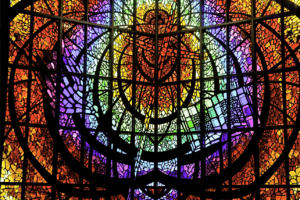Updated Feb. 13 with comments from HSU president Eric Bruntmyer.
An announcement late Friday that Hardin-Simmons University is closing its Logsdon Seminary surprised faculty, raised questions and prompted protests from students, alumni and friends.

Myles Werntz
“The board of trustees have determined that Logsdon Seminary will be closing after next academic year,” Myles Werntz, T.B. Maston Chair of Christian Ethics and Practical Theology at Hardin-Simmons University, posted Saturday on social media. “It comes as a huge shock to all of us.”
“I won’t be commenting beyond this: We have amazing, faithful students, who deserve better than this,” said Werntz, who was named just last fall as the new director of the master-of-divinity program at Logsdon. He also serves as Logsdon’s assistant professor of Christian ethics and theology.
University officials cited financial reasons for closing the seminary, but alumni and friends posting on social media said a small but influential group of individuals has been working behind the scenes to convince trustees that the school aligned with the Cooperative Baptist Fellowship is too liberal to be trusted in today’s Baptist General Convention of Texas.
More than 50 Logsdon supporters signed an open letter Feb. 5 praising “the positive impact of Logsdon Seminary graduates” and offering to meet for dialogue with the Hardin-Simmons board of trustees.
Kyle Tubbs, a 2010 M.Div. graduate and president of the Logsdon Alumni Council, said he was “devastated” by the decision to close the seminary.
“The decision to close Logsdon Seminary is not only a loss for Hardin-Simmons University and the West Texas region, but for the world,” said Tubbs, new church starts manager for the Cooperative Baptist Fellowship. “Logsdon has alumni serving as ministers, professors, chaplains, denominational leaders, pastors, and missionaries. Former Logsdon students now serve in churches, universities, hospitals, nonprofits, both new and traditional churches, and in mission work around the world.”
Logsdon Dean Bob Ellis said in a letter to students that he is “deeply saddened” by the decision to close the school. “I tried everything within my power to persuade the administration and trustees to maintain their commitment to Logsdon, but that was not their choice,” said Ellis, who will continue serving as dean through the end of the semester.
Current students protested strongly in an open letter to President Eric Bruntmyer and the Hardin-Simmons board of trustees.
“We officially declare to the administration, to the trustees, and to President Bruntmyer, that we do not stand with this decision,” the students said. “We do not support the passiveness that has been demonstrated to Logsdon in the past two years by HSU and the direction that the school is taking. We feel that closing Logsdon is not in accordance with the will of God, nor is it a real demonstration of Christian love and service.”
Paul Baxley, executive coordinator of the Cooperative Baptist Fellowship, described the school’s closure as “a tremendous loss.”
“For 25 years, the ministry of Logsdon Seminary has blessed Cooperative Baptist partner congregations and indeed our whole Fellowship, as well as Baptists and communities far and wide,” Baxley said. “From its beginning until now, the faculty of this school has demonstrated a deep love for Christ and His church, a commitment to the Scriptures, and a deep desire for the thriving of congregations.”
Logsdon Seminary is part of the Logsdon School of Theology, established in 1983 with a $3 million gift, at the time the largest in the university’s history, from Koreen Logsdon of Abilene, Texas, in memory of her husband, Charles, who graduated in 1928, served 15 years as a trustee and died in 1981. The school began offering M.Div. degrees in 1995, and today offers the master of divinity, master of arts in family ministry, master of arts in religion and doctor of ministry.
Founded at a time when Southern Baptist Convention seminaries were turning away women called to be church pastors, Logsdon Seminary from the start fully affirmed both men and women in all positions of vocational ministry. Today about 35 percent of masters-level students are female, 30 percent are non-white and almost 17 percent are from countries other than the United States.

Logsdon Seminary chapel window
Logsdon is accredited by the Association of Theological Schools, which lists enrollment of 125 students with a full-time equivalency of 68.3. Five faculty teach full time, and three others part time.
Laura Moore, chair of the Hardin-Simmons board of trustees, said in a video on the university website that the closure was a “necessary action to maintain financial sustainability.”
Logsdon Seminary was one of a number of divinity schools opened by Baptist colleges and universities in an era when the six seminaries owned by the Southern Baptist Convention were openly embracing fundamentalism.
Alumni have been warning for some time that Logsdon’s style of scholarship increasingly is viewed as a liability rather than an asset as the formerly moderate leadership of the Baptist General Convention of Texas drifts closer to the views of the conservative leadership of the SBC and away from the more moderate Cooperative Baptist Fellowship.
“There is a small, but very influential fundamentalist group influencing both the current leadership at HSU and some of its trustees, as well as other areas of Texas Baptist life,” Tubbs posted on Facebook.
“For the last couple of years, they have smeared Logsdon’s professors,” he said. “They lied about Logsdon’s theology. At first they tried to use LGBTQ the same way fundamentalists used inerrancy decades ago. That didn’t stick. Then they tried to use the Bible itself again, which also didn’t have merit. The playbook was the same: Use a certain issue to try to create division and trap Logsdon. Time and time again, it didn’t stick. Then, the broad label of ‘liberal’ was thrown around to accuse Logsdon, which is where we are today.”
Corey Cornutt, a 2008 graduate of Logsdon Seminary and pastor of First Baptist Church Grandview, Texas, mourned on social media that Logsdon “will no longer be a home where a diverse student body of different ages, genders, ethnicities and theological persuasions could gather to find common ground in love of and service to Christ.”
“I mourn a university hiding behind financial excuses to follow the trend of this world to extinguish voices of moderation and instead pick the ‘appropriate’ side,” he said. “Most of all, (and selfishly so) I mourn for young women and men growing up in West Texas believing themselves to be called by God and His church into the ministry who will no longer have a local institution to physically attend to flesh out such a calling.”
The university said Feb. 8 that the administration, trustees and other campus leaders “are listening closely to all feedback and community concerns” related to the closure.
Current seminary students will be provided a teach-out program to finish their degrees. The Logsdon School of Theology will continue as an undergraduate program within the Parker College of Liberal Arts.
Two years ago Hardin-Simmons University reduced its teaching staff by 30 positions by eliminating a number of low-enrollment programs including five Logsdon Seminary campuses across Texas.
Additional cuts announced Friday, including closure of Logsdon Seminary and its graduate programs, are part of a strategic financial plan called The Way Forward.
“Our trustees made these decisions with prayerful consideration and spiritual discernment, emphasizing that Hardin-Simmons will continue to hold to the Christian values on which it was founded,” the university said.
“Our students will continue to participate in chapel services and weekly Bible studies,” the administration said in a statement. “They will have expanded opportunities to participate in ministry events locally and abroad and to take additional Bible courses.”
Hardin-Simmons President Eric Bruntmyer said Feb. 12 that “while theological issues did come up in our discussions, this was solely a financial decision.”
Bruntmyer, who became president of the Texas Baptist school in 2016, said the seminary has lacked appropriate funding since its launch in 2004. To cover costs, “funds designated for the Logsdon School of Theology were consistently moved over to the Logsdon Seminary in order to cover the deficits that occurred from the initial and continual lack of funding,” he said in an open letter on the university website.
Related commentary:
Jonathan Davis | Logsdon Seminary will be shuttered: 7 Questions for Hardin-Simmons University’s president and trustees
